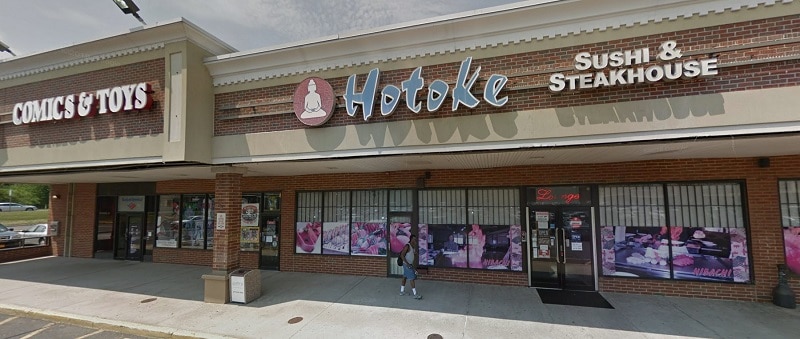In high school, I worked at a takeout Chinese food place.
It was a $5 an hour, under the table job where I answered the phone. I took orders, put them together in containers, and then passed them to the cashier who gave it to the delivery guy or waited until the customer showed up.
I became friends with the three chefs who worked there. One guy chopped, one guy set up the ingredients for the next dish, and one guy cooked. When it was busy, the setup guy also cooked. It was a well-oiled machine.
After a year at the takeout place, I was moved to a buffet that also did a brisk takeout business. This operation was much bigger. There were now five+ chefs, three+ prep guys, and two dishwashers.

One day at the buffet place, I saw a couple sheets stapled together on the counter. It was a contract for a future employee to come over from China. I didn’t ask but I’m certain everyone working in the restaurant was Fukienese (or Fujianese, to mean they were from Fujian in China). The owner was from there and it seemed like he was trying to bring folks he knew, or his family knew, to the United States for work.
I only saw the first page but it was a contract that had the person work in the restaurant for several years in return for sponsoring and paying for the trip. It looked like a fair deal, not like a modern-day indentured servitude, but it was still a lengthy obligation. I was told that there were dorm rooms upstairs for many of the employees to sleep too.
I was only a teenager but that moment stuck out in my mind. Even today, I remember the dot matrix printed page and what it meant.
Table of Contents
Debt Creates Servitude
When that individual signs that contract, they owe a debt. It’s a debt that has to be repaid with work in the restaurant.
For that person, it was an opportunity to come to the United States and to, hopefully, a better life for themselves and their kids. It’s a debt but also an investment of time, the most precious of resources.
It wasn’t that long ago that some human beings owned other human beings. The 13th Amendment, which formally outlawed slavery, wasn’t ratified until December 1865, that’s only 159 years ago. (you could argue the Emancipation Proclamation in 1863 effectively ended it, but that only adds two more years)
Today, people don’t own one another… but financial obligations create an implicit servitude. Just like that employee who would sign away a few years of labor for a ticket (and sponsorship) to come to the US.
Many people work jobs they hate because they don’t have a choice. They’re (wage) slaves not because they are legally bound to an employer. They are bound to work because of their debts.
They have to work or they risk losing their house, their car, or some other asset.
That servitude is an iron shackle.
Iron Shackles vs. Golden Handcuffs
There are two types of constraints – Iron Shackles and Gold Handcuffs.
Iron shackles are the shackles you wear because of debt. Your mortgage, your rent, and your car payment are examples of iron shackles. You must pay them or you don’t have a place to live or a way to get to work.
Some shackles make sense. A car represents a way for you to invest in yourself because it frees up more of your time. You enter into it knowing full well it’s a shackle but it gets you to the next level. Maybe it opens up opportunities for work. Maybe it just frees up an hour you don’t have to ride public transportation each day. Either way, it’s a decision with an upside.
Some shackles don’t make sense. Buying a luxury item with your credit card when you have a balance. I have nothing against luxury items but it doesn’t make sense to add to a double-digit interest rate credit card balance for an item that is more expensive solely because you appreciate what it signals to others. That’s a bad shackle.
Golden handcuffs are the carrots of the world. These are the stock options you’re promised if you work for X years. These are the bonuses you get each year, to ensure you work until the end of the year. These are financial incentives designed to keep you there. They’re certainly nicer than iron shackles but they’re constraints all the same.
Companies offer golden handcuffs all the time because talent is hard and expensive to replace.
Whether it’s iron shackles or golden handcuffs, the result is the same. You’re stuck. You can’t get out because the financial incentives are too great. Either you work to pay the bills or that dangling carrot keeps you glued to your spot.
Income Streams are the Key
Income streams are the key to unlocking shackles and handcuffs. This is why many millionaires have 7+ streams of income. They’ve been able to escape financial gravity and build these engines of growth that don’t require their active time.
As you save and as you invest, you create these separate streams that give you greater financial flexibility.
When you have passive income streams, you aren’t as beholden to your employer. As these income streams grow, often when you reinvest the cash flow they produce, they become a greater and greater percentage of your total annual income.
That’s why financial independence is possible when you get that “f you money.” They call it “f you money” for a reason. It’s enough money that you can tell your boss to pound sand when he or she tells you to do something you don’t want to.
They also act as a mini-insurance policy. I’m self-employed and so my income can be irregular. If things go south, I can’t lean on a larger organization to support me financially as I get through the slow periods. I deliberately invested in dividend growth stocks out of necessity.
In 2022, interest and dividends accounted for 23% of our total income. If our business implodes, I can tap into a small stream of income to help through the lean months. And websites can go to zero without warning – it’s just an unfortunate part of the game.
Step 1. Save As Much As Possible
You’ve probably heard that most Americans have a modest net worth and practically no retirement savings. The biggest reason is because Americans don’t save enough.
The Personal Savings Rate had improved during the pandemic (stimulus does that!) but in recent years it’s been quite low. Only 3.7% as of December 2023.
The more you save, the more you can deploy into assets that generate income. If you think you’re tapped out of ideas, check out our list of 105 ways to save for inspiration.
Step 2. Then Hustle Like Crazy
Saving money is one thing but it only gets you so far. Eventually, you need to look at the income side of the equation. If you’re working a job, you can only try to get a raise or promotion so often. Play that game if you haven’t already.
After saving, you need to be monetizing your leisure time. No one ever thought they were going to get rich by driving for Uber. You can point to any of the ways to money driving your car and they offer a way to monetize your downtime. You can potentially turn your commute into a profit center rather than an expense every day.
The perfect side hustle is one that can grow into something bigger but don’t sleep on the ones that put a few dollars in your pocket. If you save $30 a month for 5 years (8% annual return), you’ll end up with over $2,200. That’s less than a dollar a day.
$2,200 isn’t a ton of money but that’s a start towards unlocking those constraints.
And that’s true financial freedom.
Step 3. Build Income Streams
The next important question is where should you look to build income streams? That’s a question only can answer.
I suggest you start with something that is low risk and had a ton of liquidity – the stock market. You can get into dividend stocks or stick with an index fund. Vanguard’s Total Stock Market Index Fund (VTSAX) has a 1.38% yield with a 0.04% expense ratio. The Vanguard 500 Index Fund (VFIAX) has a 1.42% yield with a 0.04% expense ratio. Those are the Admiral shares, you can get the same as an ETF.
Either way, you get a yield and a trickle of income.
As you save more and are looking to diversify outside of the stock market, you could turn to any number of income producing assets. Real estate is a great option to dabble in. I personally am invested in a few crowdfunded real estate sites because I can get higher yields through real estate without owning any property. I’ve gone the property route and it isn’t for me (yet).
This is where you need to do more research and see what is most appealing to you. Avoid trying to gamble and take risks, like dabbling in cryptocurrencies, this is about securing your future and building reliable streams you can depend on and grow.
As your streams go, remember to reinvest the cash flow so it snowballs into something significant.
Before you know it, more and more of your income will come from these sources!




Nice post, Jim. It would be interesting to hear why you haven’t found real estate investing to be a solid fit. I’m a full-time investor and have never owned a lick of real estate. However, I’ve considered going that route a few times but held off.
I haven’t found investing directly in real estate (owning property) to be a good fit. It just strikes me as a lot of work and taking the hands-off approach (with partners) didn’t work for me before. I’ve dabbled with crowdfunded real estate (in Realtyshares) but that’s the extent of it.
Roger. I’m pretty much of a similar mind.
Good stuff JIm! Multiple income streams have been key to helping me save more, pay off debt quicker, and protect myself during job loss. Hoping to one day turn some of my side businesses into full-time income.
You can do it!
Hey Jim,
I like the idea you present in this article. Develop one passive income stream to its entirety, then move on to the next!
Thanks.
NIce comprehensive post here Jim. Lays out the argument/necessity for financial independence and the steps and options to get there in a clear linear path. Good article.
Thanks Drew! I think there are many perspectives when it comes to financial independence and I wanted to share how I think about it, perhaps it’ll resonate with some folks.